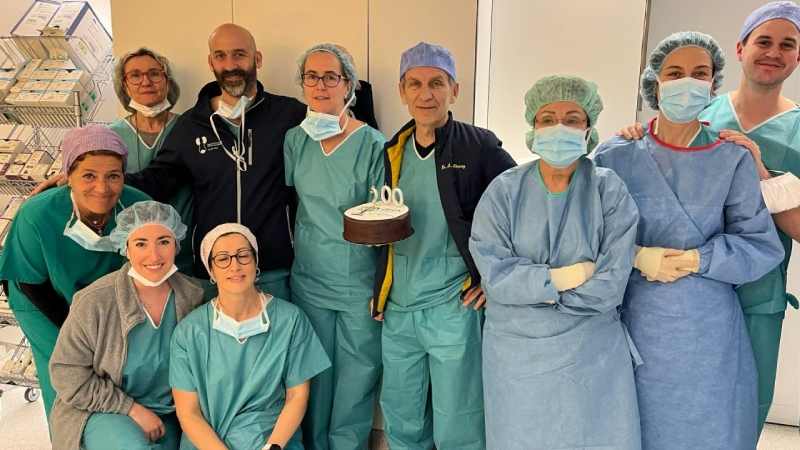15 May, 2024
Clínic Barcelona is the first Spanish hospital to reach 200 robotic kidney transplants

In June 2015, the first robotic kidney transplant was carried out in Spain. That first intervention was carried out at the Clínic hospital in Barcelona and Dr Antonio Alcaraz, head of the Urology and Kidney Transplant service at the Clínic and barnaclínic+ professional, was the one who led the intervention. Now, less than eight years later, the Clínic achieves a new milestone by being the first Spanish hospital to perform 200 of these robotic transplants. A new step forward in a long path that began much earlier, in 1965, when Dr Gil-Vernet performed the first kidney transplant in Spain, also at the Clínic hospital.
“Surgery is going to evolve towards less invasive techniques without losing precision and that is what robotic surgery brings,” explains Dr Antonio Alcaraz, who highlights how the previous learning carried out with the robot in prostate surgeries served to be able to take the leap in a simple way in kidney transplant. “Thanks to robotic surgery it is possible to perform intracorporeal kidney transplant. In this way, incisions are reduced and recovery is better, reducing the risk of hernias and infections of the abdominal wall,” adds Dr Mireia Musquera, senior specialist in the Urology and Renal Transplant Service of the Hospital Clínic and barnaclínic+.
“Surgery is going to evolve towards less invasive techniques without losing precision and that is what robotic surgery brings”
Dr Antonio Alcaraz, head of the Urology and Kidney Transplant service at the Clínic and barnaclínic+ professional
IT MAY INTEREST YOU…
· The Clínic reaches the milestone of 200 kidney transplants in one year
· The team of Dr. Antonio Alcaraz combines robotic and NOTES surgery to perform a kidney transplant
ADVANTAGES OF ROBOTIC KIDNEY TRANSPLANT
In this way, although robotic kidney transplant does not represent any time savings compared to the conventional one, it does represent, due to its minimally invasive approach, a less aggressive option that allows reducing the risks that may arise during and after the intervention. This has allowed fragile patients with end-stage renal failure to also have an alternative that they lacked before the appearance of this technique. “Kidney transplant is a very special surgery because it stops a patient from undergoing dialysis and also increases their survival,” adds Dr Musquera.
“Kidney transplant is a very special surgery because it stops a patient from undergoing dialysis and also increases their survival”
Dr Mireia Musquera, senior specialist in the Urology and Renal Transplant Service of the Hospital Clínic and barnaclínic+
“Robotic surgery in kidney transplants represents a paradigm shift in the performance of this type of intervention, with the Hospital Clínic being a European benchmark in this type of surgery”, adds Dr Alcaraz. Key to this entire process is a team made up of professionals from nephrology, radiology, anaesthesia, immunology, nursing, and the donation and transplant coordination section.
“Robotic surgery in kidney transplants represents a paradigm shift in the performance of this type of intervention, with the Hospital Clínic being a European benchmark in this type of surgery”
Dr Antonio Alcaraz, head of the Urology and Kidney Transplant service at the Clínic and barnaclínic+ professional
“Robotic surgery offers us many advantages. For example, the great magnification of the optics and we also have a 3D vision,” explains Dr Musquera, who adds how the instruments in this type of surgery allow greater mobility than other instruments, such as laparoscopic surgery. “These only allowed us to move laterally. All this magnification and this better mobility of the instruments allows us to do a much more precise dissection of the areas where we are going to intervene, obtaining better results,” she continues explaining.
EXPANDING THE USE OF ROBOTIC SURGERY
Currently, around 40 living donor kidney transplants are performed annually at the Barcelona Clínic. Of them, around 80% are performed with the robotic approach. This technique has also now begun to be used in cases of kidney transplants from deceased donors, although in these cases in a very selected way.
Kidney transplant is a surgical treatment in which a healthy kidney obtained from a living or cadaveric donor is implanted into a patient with chronic kidney disease to replace the functions performed by the damaged kidney and thus avoid dialysis. The objective of the transplant is to restore kidney functions, such as the purification of toxins from the blood, hydro-electrolyte balance, hormone synthesis… During surgery, the professional places the new kidney in the lower part of the abdomen. Subsequently, he connects the artery and vein of the kidney to the iliac vessels. Finally, the connection of the ureter (duct that carries urine) to the urinary bladder is made.
IT MAY INTEREST YOU…
· Hospital Clínic is the first Spanish centre to perform 1,000 living donor kidney transplants



 “Kidney transplant is a very special surgery because it stops a patient from undergoing dialysis and also increases their survival”
“Kidney transplant is a very special surgery because it stops a patient from undergoing dialysis and also increases their survival”